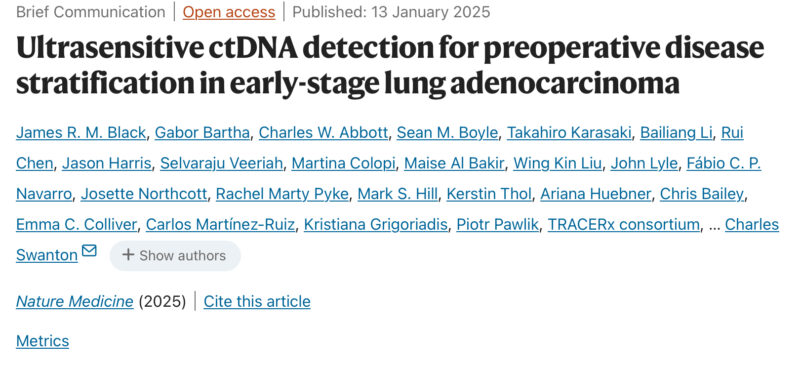Scientists from the Francis Crick Institute, UCL, UCLH, and Personalis have developed a promising new test to predict lung cancer outcomes.
The test detects circulating tumor DNA (ctDNA) in the blood, offering a potential breakthrough in assessing cancer prognosis.
ctDNA, which is released into the bloodstream by tumors, has long been linked to disease progression, but its measurement has posed challenges.
However, a new study, published today in Nature Medicine, showcases the high sensitivity of a test developed using the NeXT Personal platform. This platform can detect ctDNA in amounts as small as 1 part per million.
The research team applied this technology to blood plasma samples from 171 people with early-stage lung cancer as part of the TRACERx cohort.
They found that individuals with lower ctDNA levels before surgery were less likely to experience relapse and had better overall survival rates compared to those with higher ctDNA levels.
This sensitive test can accurately detect even minute amounts of ctDNA, preventing patients with lower levels from being incorrectly categorized as ctDNA-negative.
The next step in the research will assess whether detecting ctDNA post-surgery in early-stage lung cancer patients can predict the risk of relapse, enabling doctors to tailor treatments more effectively.
“We’ve shown that the presence or absence of tumor DNA in the blood was strongly predictive of prognosis.” – James Black, Postdoctoral Clinical Fellow at the Francis Crick Institute.
He added that ultrasensitive ctDNA testing could help clinicians make more informed decisions about treatment options, improving patient outcomes.
Charles Swanton, senior author of the study, noted that lung cancer remains one of the most common and hardest-to-treat cancers, with a high relapse rate.

He hopes that sensitive ctDNA tests will allow doctors to offer more personalized treatments, potentially improving survival while minimizing unnecessary therapies.
Richard Chen, Chief Medical Officer of Personalis, highlighted the value of the NeXT Personal platform, stating that its ultra-sensitive detection could enable earlier cancer detection and treatment, giving patients a better chance of avoiding unnecessary treatments while improving overall care.
This innovative approach to monitoring lung cancer offers hope for better prognostic tools and personalized treatment plans in the future.
Authors: James R. M. Black, Gabor Bartha, Charles W. Abbott, Sean M. Boyle, Takahiro Karasaki, Bailiang Li, Rui Chen, Jason Harris, Selvaraju Veeriah, Martina Colopi, Maise Al Bakir, Wing Kin Liu, John Lyle, Fábio C. P. Navarro, Josette Northcott, Rachel Marty Pyke, Mark S. Hill, Kerstin Thol, Ariana Huebner, Chris Bailey, Emma C. Colliver, Carlos Martínez-Ruiz, Kristiana Grigoriadis, Piotr Pawlik, David A. Moore, Daniele Marinelli, Oliver G. Shutkever, Cian Murphy, Monica Sivakumar, TRACERx consortium, Jacqui A. Shaw, Allan Hackshaw, Nicholas McGranahan, Mariam Jamal-Hanjani, Alexander M. Frankell, Richard O. Chen and Charles Swanton



